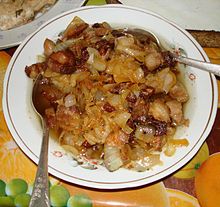Gribenes
 Chicken gribenes | |
| Alternative names | Grieven |
|---|---|
| Type | Snack, side dish, or garnish |
| Created by | Ashkenazi Jews |
| Main ingredients | Chicken or goose skin, onions |
Gribenes or grieven (Yiddish: גריבענעס, [ˈɡrɪbənəs], "cracklings"; Hebrew: גלדי שומן) is a dish consisting of crisp chicken or goose skin cracklings with fried onions.
Etymology[edit]
The word gribenes is related to the German Griebe (plural Grieben) meaning "piece of fat, crackling" (from the Old High German griobo via the Middle High German griebe),[1] where Griebenschmalz is schmaltz from which the cracklings have not been removed.
History[edit]
A favored food in the past among Ashkenazi Jews,[1][2] gribenes appears in Jewish stories and parables, for example in the work of the Hebrew poet Chaim Nachman Bialik.[3] As with other cracklings, gribenes are a byproduct of rendering animal fat to produce cooking fat, in this case kosher schmaltz.[4][1][2]
Gribenes can be used as an ingredient in dishes like kasha varnishkes, fleishig kugel, and gehakte leber.[5]
Gribenes is often associated with the Jewish holidays Hanukkah and Rosh Hashanah.[1][2] Traditionally, gribenes were served with potato kugel or latkes during Hanukkah.[2][6] It is also associated with Passover, because large amounts of schmaltz, with its resulting byproduct gribenes, were traditionally used in Passover recipes.[1][7]
Uses[edit]
Gribenes can be eaten as a snack on rye or pumpernickel bread with salt,[8] or used in recipes such as chopped liver,[9] or all of the above.[7] It is often served as a side dish with pastrami on rye or hot dogs.[9][10]
The dish is eaten as a midnight snack,[11] or appetizer.[1][10] In Louisiana, Jews add gribenes to jambalaya in place of (treyf) shrimp.[1] It was served to children on challah bread as a treat.[2] It can also be served in a GLT, a modified version of a BLT sandwich that replaces bacon with gribenes.[12]
See also[edit]
References[edit]
- ^ a b c d e f g Gil Marks, Encyclopedia of Jewish Food, p. 239 (John Wiley and Sons, 2010). ISBN 978-0-470-39130-3. Found at Google Books. Accessed January 4, 2011.
- ^ a b c d e Esther Rosenblum Cohen, "Chicken Fat", Jewish Magazine, August 2007. Found at Jewish Magazine online. Accessed January 4, 2011.
- ^ Random Harvest: The Novellas Of Bialik
- ^ Claudia Roden, The Book of Jewish Food, Penguin Books, 1999, p. 56
- ^ Grossinger, Jennie (1958). The Art of Jewish Cooking. Random House.
- ^ Miriam Rubin, "This kugel is about NOT using your noodles", Pittsburgh Post-Gazette, November 22, 2010. Found at Pittsburgh Post-Gazette website. Accessed January 4, 2011.
- ^ a b Karen Miltner, Blog, "What's on My Plate: Miscellaneous Monday musings", Democrat and Chronicle, November 29, 2010. Found at Democrat and Chronicle, online blogs section. Accessed January 4, 2011.
- ^ Amy Scattergood, "Chef recipes: A Recipe From the Chef: Ilan Hall's Gribenes Sandwich," 'LA Weekly, December 23, 2009. Found at LA Weekly website Archived 2012-04-05 at the Wayback Machine. Accessed January 4, 2011.
- ^ a b P Campbell, "Restaurant News, Updates: Pastrami, babka and schmaltz and gribenes", October 14, 2010. Found at Cincinnati.com website Archived 2010-10-22 at the Wayback Machine. Accessed January 4, 2011.
- ^ a b Frank Bruni, "Quit Kibitzing and Pass the Gribenes", New York Times, February 13, 2008. Found at New York Times website. Accessed January 4, 2011.
- ^ "Recipes: Charlie Klatskin's Gribenes," found at PBS website. Accessed January 4, 2011.
- ^ Scattergood, Amy (2009-12-23). "A Recipe From the Chef: Ilan Hall's Gribenes Sandwich". L.A. Weekly. Retrieved 2019-05-24.
